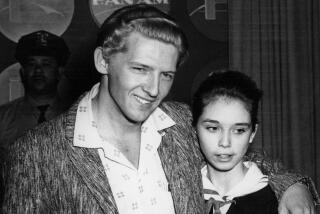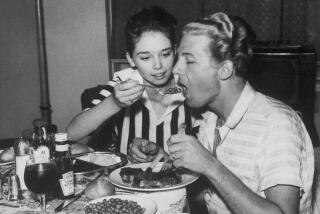Living to play again
THE bullet is still there in Cris Kirkwood’s back, a permanent reminder of how bad it got for him.
He was outside a post office in Tempe, Ariz., that day in 2003 when he exchanged words with a woman who complained about his parking. Then he got into it with a security guard who intervened. Kirkwood, who weighed more than 300 pounds and was in the grip of severe heroin addiction, grabbed the guard’s baton and hit him with it. As the struggle continued, the guard drew his gun and fired.
Kirkwood says that he surprised the doctors by suffering no motor damage in his lower extremities, and he went to prison for 18 months for the assault.
That was bad, but the real low point had come five years earlier, when his wife, Michelle Tardif, died in their bedroom from a drug overdose. In comparison, Cris’ arrests, the broken relationships, the physical damage and his fall from the pinnacle of indie-rock prominence as a member of the Meat Puppets didn’t seem like so much. Not that it sobered him up.
Even by the standards of rock-lifestyle excess, Cris Kirkwood’s story, which was detailed in a widely read 1998 Phoenix New Times article by David Holthouse, ranks as extreme. Instead of the co-pilot of one of alternative rock’s most admired and influential bands, he was now known mainly as one of its most notorious casualties.
His brother Curt, the Meat Puppets’ singer and guitarist, certainly didn’t hold out much hope.
“No, no, none. I completely [wrote] him off years ago. A junkie, you don’t deal with them at all, it doesn’t do you or them any good.... You write them off as dead.”
Cris shows a faint smile as he listens calmly to his brother’s harsh evaluation. They’re sitting in their van in front of the Troubadour in West Hollywood, where in a few hours they’ll try to reconstitute the old Meat Puppets magic for a crowd of fans who thought they’d never have this chance again.
“I don’t know about reclaiming anything, but definitely to be able to just do this again, it’s a ... riot,” says a beaming Cris Kirkwood, who began willing himself back toward a functional life after leaving the Federal Correctional Institution in Phoenix in mid-2005, and is now a Meat Puppet once again.
“Me and him together have a weird thing -- it’s a really neat thing,” Cris adds, looking at Curt. “There’s a certain place you can get to. It was a thing that happened live a lot. Like the audience and some weird energy would get going and suddenly you’d get to this trippy place that I really dug.”
The prodigal bassist’s return has reanimated one of rock’s most colorful entities, a freewheeling outfit with a wild-eyed vision and a disregard for musical borders. Starting in 1980, the Kirkwoods and drummer Derrick Bostrom made music that evolved from punk to Grateful Dead-like folk-country.
With their desert origins, surreal imagery and exploratory impulse, they were invariably tagged as pioneers of post-punk psychedelia, and their mind-bending ways have been adopted and absorbed into the fiber of rock.
“I don’t think we properly credit them for how much they influenced us,” says bassist Lou Barlow, who recently reunited with guitarist J Mascis and drummer Murph to take the original Dinosaur Jr. lineup into the studio and out on the road again.
“They weren’t afraid to be influenced by anything and everything,” Barlow adds. “People get kind of neurotic about the way they show their influences and doing it the right way and being cool. But they made no attempt to be cool or fit in the scene, and that was pretty incredible.”
You can hear their impact in such artists as the Pixies, Beck and Queens of the Stone Age, but the Meat Puppets’ most notable fan and patron back then was Kurt Cobain, who performed the Meat Puppets songs “Plateau,” “Oh Me” and “Lake of Fire,” with backing from the Kirkwoods, on Nirvana’s 1994 “MTV Unplugged” album and telecast.
The simultaneous reemergence of the Meat Puppets and Dinosaur Jr. is a reminder of the remarkable output of SST Records in the 1980s, when the Lawndale-based label run by the South Bay punk band Black Flag released records by those two bands as well as Sonic Youth, the Minutemen, Flipper, Husker Du and other groups that laid the groundwork for alternative rock, wearing grooves in the interstates for few rewards beyond the satisfaction of playing.
“There needs to be some of them around, because not many of them stuck it out,” says Curt Kirkwood, sitting in the middle row of the van. “What happened to the promise of that era? Was it completely swallowed up by hip-hop and cruddy pop? ... There has to be some legacy; there has to be heritage artists in every generation.”
Mike Watt, who played bass in the Minutemen, is one of the old cohorts who’s dropped by to welcome the Meat Puppets back to town.
“Personal problems were probably in the way before,” says Watt, reflecting on his friends’ return. “You have to grow up a little, and you get those problems subdued and you can get back to your aesthetic that you started off with.
“A band is like a little country, a little political organization -- of course you’re going to have schisms and stuff. But if you weather it you can come back, especially if you hit upon a sound that was unique and genuine.”
A prison change
CRIS KIRKWOOD looks as if he’s been through it. He’s 46, but from his lined and weathered face you’d guess a decade older. But he’s down to a trim 175 pounds, and he has some teeth now to replace his addiction-destroyed originals, courtesy of a Phoenix dentist who used to see the Meat Puppets when he was a student and did the work for free.
And he’s clear-eyed and present, without any of the robotic remoteness that often accompanies recovery. He says he’s not hesitant to answer questions about his difficult times -- “I figured they would have to come up a lot,” he says -- and at the end of the interview he asks, with disarming sincerity, “How did I do?”
The musician credits his return to his prison stretch, which was long enough to let him break his physical addiction, and strong support from his girlfriend, bassist Ruth Wilson, and her parents.
“That amount of time away without that kind of self-medication to deal with my emotional problems allowed me to focus on that and in some ways come to terms with my emotional wounds,” he says. “I just never managed to deal with the pain that was causing me to continue to use. Which was just the emotional pain of having done that to myself. I’d dope and maybe ruin my life to a degree, then I needed dope to deal with the amount of damage I’d done to myself.”
When he felt strong enough, Cris made contact with Curt’s son Elmo, who’s now 23 and opening the Meat Puppets’ shows with his band, Kirkwood-Dellinger. When Curt got word from him and some trusted friends that his brother seemed to be back, he took what he calls a leap of faith.
“I just went, ‘OK, you’re rehabilitated. Let’s bury the hatchet totally.’ ... As good as I am at burning bridges, I’m as good at burying hatchets, and I don’t hold grudges, so I was just like, ‘Let’s move on. The past is dead.”
During Cris’ absence, Curt had meandered, physically and musically. He spent a couple of years in Venice, Calif., and now lives in Austin, Texas. He made a Meat Puppets album with other musicians, formed a short-lived group called Eyes Adrift with Nirvana’s Krist Novoselic and Sublime’s Bud Gaugh, and toured on his own, releasing a solo album, “Snow,” in 2005.
With Cris back, it didn’t take long for the brothers to jump-start the Meat Puppets. Ted Marcus was brought in on drums to replace the retired Bostrom, but it was the brother act that made it go.
“That’s something that you can’t really think about, we can’t practice it,” says Curt. “What actually happens is more like that kind of chemistry.
“I was under the impression that I could make the band as an art project using just about any component, which is kind of interesting, but I had to feel that way because he was [messed] up and Derrick quit. I don’t feel like quitting, I don’t feel like putting my nice band down....
“We got back together, practiced about two days and made the record, that’s it.”
“We didn’t practice at all before we made the record,” Cris says with a laugh.
Their album, “Rise to Your Knees,” will come out in July on the small Anodyne label.
“It’s really pretty easy,” says Curt, reiterating the enduring aesthetic. “These are the chord changes -- it’s not rocket science. Don’t over-think it, because you start to be able to hear that. I hear that in a lot of stuff that’s real successful. I hear trying and ambition and endeavor as opposed to emotion and spirit....
“People drink and smoke dope and listen to rock music.... This is what it is for better or for worse.... It’s supposed to be so much fun, it’s supposed to be the best thing, it’s Elvis and the Beatles and Michael Jackson, it’s the best craziest [stuff] there is.”
Later that evening, the Meat Puppets enter that zone again. There’s nothing tentative about their performance, with Curt unfurling elegant runs and distorted shrieks from his pistachio green Stratocaster while Marcus provides an unshakable beat..
But the eyes naturally gravitate to the gnomish Cris Kirkwood, whose shirt becomes more and more soaked as he bounces and bobs at stage left, rolling out his round, reliable bass lines and singing his snug, tart harmonies. He looks absolutely transfigured, back where he thought he’d never be again. Someplace trippy, someplace he really digs.
--
More to Read
The biggest entertainment stories
Get our big stories about Hollywood, film, television, music, arts, culture and more right in your inbox as soon as they publish.
You may occasionally receive promotional content from the Los Angeles Times.






